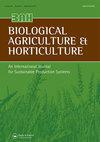植物生长促进剂、生物防治剂和微生物土壤添加剂对荞麦光合效率、冠层植被指数和产量的影响
IF 1.6
4区 农林科学
Q3 AGRONOMY
引用次数: 8
摘要
摘要微生物土壤添加剂和植物生物刺激剂含有能够增强植物抗逆性、提高作物产量和质量的物质和微生物。对可持续农业生态农业系统的这种投入的兴趣导致了一系列产品的开发。本研究的目的是确定一些微生物土壤添加剂(MSAD)、植物生长促进剂(PGPs)和生物防治剂(BCAs)对普通荞麦(Fagopyrum esculentum Moench)的光合效率、冠层植被指数和产量的影响。研究表明,BCAs、腐霉和枯草芽孢杆菌单独浸种对荞麦产量有显著影响。在浸泡在含有P.oligandrum(ET0/RC)的溶液中的种子生长的植物中以及在用MSAD UG Max(ABS/RC,TR0/RC)处理的土壤中观察到叶绿素a荧光指数的增加。用两种MSAD中的任何一种处理也增加了归一化差异植被指数(NDVI)。将种子浸泡在PGPs和BCAs中只影响叶绿素a荧光参数,而用PGPs喷洒植物和用MSAD处理土壤的联合处理不仅影响叶绿素a的荧光参数(FV/FM、ET0/RC、DI0/RC),叶面积指数(LAI)(p=0.058)和NDVI(p=0.186)也有下降的趋势。本文章由计算机程序翻译,如有差异,请以英文原文为准。
Effects of application of plant growth promoters, biological control agents and microbial soil additives on photosynthetic efficiency, canopy vegetation indices and yield of common buckwheat (Fagopyrum esculentum Moench)
ABSTRACT Microbial soil additives and plant biostimulants contain substances and microorganisms that can enhance stress tolerance in plants and increase the yield and quality of the crop. The interest in such inputs for sustainable and agroecological farming systems has led to the development of a range of products. The aim of the study was to determine the effects of some microbial soil additives (MSADs), plant growth promoters (PGPs) and biological control agents (BCAs) on photosynthetic efficiency, canopy vegetation indices and yield of common buckwheat (Fagopyrum esculentum Moench), an under-utilised nutraceutical crop. The study showed that soaking the seeds in the BCAs Pythium oligandrum and Bacillus subtilis, on their own, had significant effects on the yield of the buckwheat. Increases in chlorophyll a fluorescence indices were observed in plants grown from seeds soaked in a solution containing P. oligandrum (ET0/RC) and also in soil treated with the MSAD UG Max (ABS/RC, TR0/RC). Treatment with either of the two MSADs also increased the normalised differential vegetation index (NDVI). Soaking the seeds in PGPs combined with BCAs affected only the chlorophyll a fluorescence parameters, whereas the combined treatment of spraying the plants with PGPs and treating the soil with MSADs affected not only the chlorophyll a fluorescence parameters (FV/FM, ET0/RC, DI0/RC), but also indicated a tendency for a decrease in the leaf area index (LAI) (p = 0.058) and the NDVI (p = 0.186). The correlations between grain yield, chlorophyll a fluorescence parameters and vegetation indices of the canopy were discussed.
求助全文
通过发布文献求助,成功后即可免费获取论文全文。
去求助
来源期刊
CiteScore
3.30
自引率
6.70%
发文量
18
审稿时长
>36 weeks
期刊介绍:
Biological Agriculture & Horticulture aims to act as the central focus for a wide range of studies into alternative systems of husbandry, and particularly the biological or organic approach to food production. The Journal publishes work of a sound scientific or economic nature related to any aspect of biological husbandry in agriculture, horticulture and forestry in both temperate and tropical conditions, including energy and water utilization, and environmental impact.

 求助内容:
求助内容: 应助结果提醒方式:
应助结果提醒方式:


